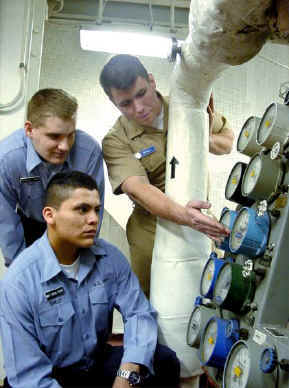During the past three decades, the number of married GIs grades E-1, E-2,
and E-3 has more than tripled. There are now twice as many military family members as GIs, and many young servicemen lack the maturity to deal with
marriage. This occurred because our military provides private quarters and extra pay for married personnel.
As a result, 34% of enlisted
GIs marry before age 21, compared to only 7.5% of civilians. Many teenager
warriors believe they have
ample pay and benefits to support a family, but later learn that
unexpected financial problems force them into debt, and frequent
separations often result in failed marriages. This lowers readiness and costs American taxpayers billions of
dollars each year.
Readiness is affected whenever family problems require a GI to moonlight,
to miss training, to miss deployments, or to take emergency leave while on
deployment. Everyone suffers when a GI troubled by family strife acts
withdrawn, irritable, and unable to concentrate on the task at hand.
Leaders are frequently distracted from their mission in order to resolve
teenage marital and associated financial problems, which are a
major factor why 30% of GIs fail to finish their first enlistment. Leaders
also find it difficult to punish young servicemen with extra duty or fines
knowing their families will suffer.

Family problems of young enlisted men were noted in 1940
when the US military began to deploy units overseas. Testimony before the
Senate Armed Services committee in 1949 cited scandalous problems during
World War II caused by "families left behind in distress by men who should not have families."
As a result, the 1949 Career Compensation Act continued
the pre-war policy of providing family benefits only to career servicemen.
This law treated all enlisted men E-4 and below with less than seven years
of service as single men. According to the Act, this policy "stemmed from
the prevailing view that such personnel make better servicemen and were
less apt to create a social problem when they were not married and, consequently, allowances should be structured so as to discourage them from
marrying."
This restriction was suspended when the Korean war broke out in 1950.
Congress recognized that it was unfair to deny family benefits to married
men who were involuntarily inducted through selective service and
reserve mobilization. This suspension continued during the draft years
until it was allowed to expire in 1973. However, establishing the
all-volunteer force required greater incentives to fill the ranks during
the 1970's. New legislation guaranteed family benefits to all enlisted and pay for junior enlisted was doubled in 1971. During the
next two decades,
anti-military attitudes began to fade while military pay was boosted ahead
of inflation.
These factors resulted in a tremendous improvement in the quality of
recruits. However, spartan barracks and shipboard life make the
government's offer of private quarters for those willing to marry very
attractive. This is one reason manpower costs have risen 80% since 1983, even after
adjusting for inflation. For example, married E-3s in Hawaii and California are paid
$18,000 more per year just for housing, and require
expensive support costs like family medical care.
By 1993, marriage problems became so disruptive and costly that Marine Corps Commandant Carl Mundy
announced his desire to ban the recruitment of married Marines. While the great majority of Marines applauded the idea, some living
in ivory towers in Washington DC hastily denounced it. Secretary of Defense
Les Aspin immediately suspended the Commandant's policy. He then appointed
a panel to review the marriage issue, which endorsed his viewpoint that
marriage has no affect on readiness.
The marriage incentive remains a readiness and fiscal problem.
(see "A New look at an Old Idea for First-Term Marriage" by Captain Alfred B. Connable in the October 2002 Marine Corps Gazette). Captain Connable urged the adoption
of General Mundy's idea of banning the recruitment of married people, and
punishing those who marry during their first enlistment. This
is the right idea, but only the wrong
approach. Marriage is a religious matter and our political leadership nor
the federal courts will allow restrictions on an individual's right to
enlist while married, or right to marry after enlistment. However, the
strong marriage incentive could be removed if all E-3s and below receive equal
pay and benefits, regardless of marital status.

A return to the traditional system in which only career servicemen are
provided private quarters would mean that teenage GIs could get married,
but that taxpayers will not reward them with a private home. This would remove a financial incentive for married people to enlist, and deter them
from marriage until they reach the grade of E-4 at around 21 years of age
with greater maturity and better pay.
Eliminating the marriage incentive will discourage hasty marriages by
teenage servicemen. It will not reward unmarried GIs for having
children in order to qualify for a housing allowance. (Men receive
a housing allowance for having a child out of wedlock.) Paper marriages
would also be eliminated, which occur when a serviceman marries an older
"friend"
often a divorcee he met at a
local bar. The "temporary spouse" gets military medical care and half the
housing allowance, or they may share an apartment.
Equal pay for teenage GIs will have many benefits. A single GI undergoing
tough entry level training will not be agitated that the married man in
the next bunk is paid 30% more. Bachelor sergeants will no longer
be incensed that many newly arrived privates get larger
paychecks. Fewer GIs will work extra hours to make up for the
absence of married personnel. Fewer military beneficiaries will mean
better overall family care and housing for career servicemen. Most
importantly, all GIs can focus more mental energy on their mission,
rather than family strife.
A policy of equal benefits for E-3s and below can be phased in
by applying
only to new enlistments. Since very few organizations in the United
States pay employees more money if they are married, civilian leaders nor
the courts should object. Obviously, eliminating the married bonus will reduce the number of Americans interested in military service. This
will not cause a recruiting problem since only 5% of recruits are married. Even without a housing allowance, most married
recruits will earn more than their current job, if they have one.
If this proves a bad policy, it can be quickly reversed. Meanwhile,
Congress should allow each Armed Service the option of testing this idea to
improve readiness and save money. The Marine Corps would adopt it
immediately, while the Army and Navy may wait a couple years to
see how it affects the Marines. Eventually, Congress may mandate this
policy for all Armed Services when they realize that it can save billions of dollars each year through fewer housing allowances,
moving expenses, and a reduced demand for family housing, family services,
and medical care. The entire U.S. military can become more ready to
rapidly deploy overseas without the scandals
of World War II caused by "families left behind in distress by men who
should not have families."
Carlton Meyer editorG2mil@Gmail.com
©2008 www.G2mil.com